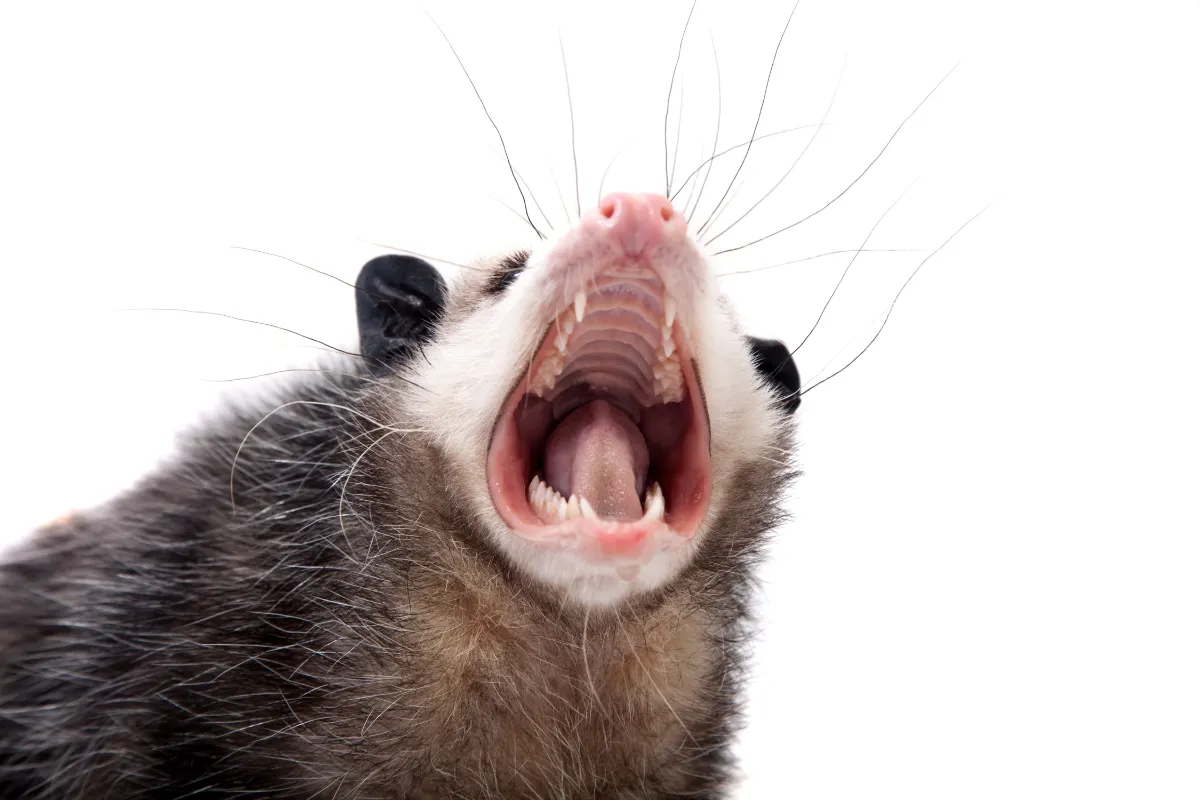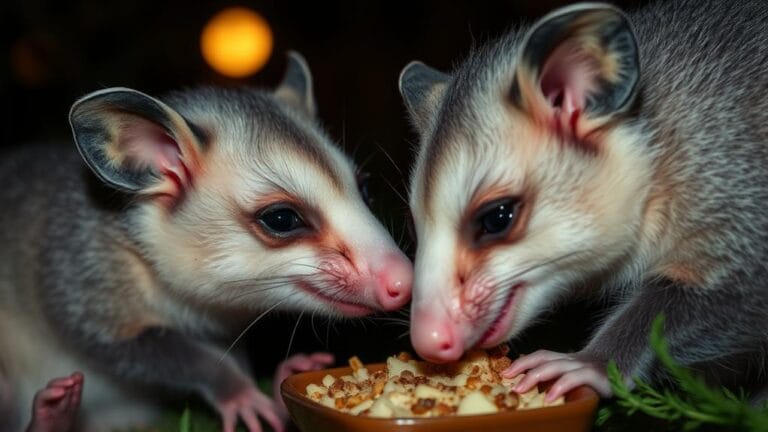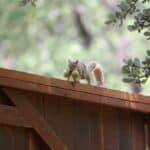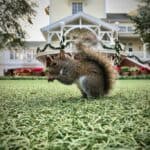Possums are fascinating creatures that have intrigued humans for centuries. They are known for their distinctive appearance and behavior, making many wonder if they are nocturnal.
Firstly, let’s define what possums are. Possums are marsupials that belong to the family Phalangeridae.
They are native to Australia, New Guinea, and Sulawesi but can also be found in other parts of the world. These animals have a unique adaptation: females carry their young in a pouch until they are fully developed.
Now onto the main topic: diurnal and nocturnal behaviors. Diurnal animals are active during the day, while nocturnal animals prefer to be involved at night. So, where do opossums fit in?
Well, opossums are primarily nocturnal, known as common or Virginia opossums.
They spend most of their waking hours at night searching for food and socializing with other opossums. Conversely, Raccoons are also known for their nocturnal behavior and are often found scavenging for food in the darkness.
Nocturnal Nature of Possums
Table of Contents
Yes, Possums are Nocturnal Animals
Possums, also known as opossums, are marsupials primarily active at night. They are commonly mistaken for rodents but are a separate species.
Opossums are known for their nocturnal behavior and can be seen roaming around for food during the night, along with raccoons. They have adapted well to this lifestyle and have developed several traits that help them survive in the dark.
Description of Possums’ Nocturnal Behavior
Possums, also known as opossums, are primarily active at night because it is easier to find food.
They have an excellent sense of smell and can locate food from a distance. During the day, opossums prefer to rest in dens or tree hollows, which shelter them from predators such as raccoons. Opossums are often mistaken for rodents, but they are marsupials.
Possums and opossums usually start their activities after sunset and continue until dawn. They move slowly and quietly, making little noise while searching for food.
Their eyesight is not very good, but they have excellent hearing, which helps them detect potential threats. Raccoons are also nocturnal creatures that come out at night to search for food.
Reasons for Being Nocturnal
There are several reasons why opossums, nocturnal creatures, work during the night.
One reason is that it helps them avoid critter control or predators that hunt during the day. Being active at night reduces their chances of being spotted by eagles, owls, and snakes.
Another reason opossums, nocturnal creatures, are active at night is to conserve energy during the day when temperatures can be high.
This animal can save energy by resting during the day and being active at night when temperatures drop while still meeting its daily needs. Critter control can be crucial in managing the presence of opossums in urban areas.
Activities and Adaptations During the Night
At night, opossums, an animal known as creatures of the night, engage in various activities, such as searching for food, mating, and socializing with other possums.
They also have adaptations that help them survive in the dark, challenging critter control for those who want to keep them away from their property.
One adaptation of opossums is their keen sense of smell. This helps them locate food sources such as fruit, insects, and small animals. They also have sharp claws that allow them to climb trees and move around in the dark.
Opossums are also known for their ability to play dead when threatened. They use this defense mechanism to avoid being attacked by predators and stay in control of the situation.
Daytime Behavior of Possums
Are Possums Nocturnal or Diurnal?
Possums are primarily nocturnal animals. However, it is also common to see possums during the daytime. While possum sightings during the day may seem unusual, several factors can influence their daytime activity.
For example, vendors selling food may attract possums during the day, and control measures may need to be implemented to prevent them from becoming a nuisance.
This is because they have a flexible schedule and can adjust their behavior based on various factors such as food availability, weather conditions, and habitat changes.
In urban areas with less natural habitat for possums and opossums, they may be forced to venture out during the day in search of food.
Factors Influencing Daytime Activity
One of the most significant factors is food availability. If plenty of food is available at night, opossums will likely remain nocturnal and avoid being active during the day.
In addition to food availability, weather conditions can also play a role in determining whether or not possums (opossums) will be active during the day.
Sometimes, opossums may need to be controlled where they threaten other wildlife or cause property damage.
If it is too hot or cold outside at night for opossums to comfortably move around and search for food, they may wait until daylight hours when temperatures are more moderate.
Finally, habitat changes such as deforestation or construction projects can also force opossums to adjust their behavior and become more active during the day. In such cases, it may be necessary to implement control measures to manage opossum populations.
Comparison with Other Species
Similarities with Other Nocturnal Creatures
Possums (opossums) are similar to other nocturnal creatures, such as bats, owls, and raccoons. These similarities include the following:
- Adaptation: These creatures have adapted to low-light environments like opossums and possums by developing specialized senses.
- Nocturnal Behavior: Opossums, like the dead possum, are also active at night when most predators are less active.
- Omnivorous Diet: Bats, owls, raccoons, possums, and opossums all eat a varied diet ranging from insects to fruits.
However, there are still some notable differences among these species. Opossums, in particular, have unique characteristics that set them apart from other marsupials. Additionally, the presence of a dead possum can have a significant impact on the ecosystem.
- Flight Capability: Bats can fly; Owls can glide silently through the air without being heard; Raccoons can climb trees quickly due to their unique anatomy. Opossums.
- Unique Senses: Bats use echolocation; Owls have an excellent hearing; Raccoons use their sense of smell more than other senses. Opossums.
Importance of Nocturnal Behavior
Role in Ecosystem
Possums are nocturnal animals, meaning they are active at night and sleep during the day.
This behavior is essential for their survival and plays a significant role in the ecosystem. Possums have adapted to their nocturnal lifestyle by developing unique physical and behavioral characteristics that help them thrive in the dark.
One of the primary reasons possums are nocturnal is to avoid predators.
During the day, they hide in dens or trees but venture out to search for food at night.
By being active at night, possums can avoid detection by predators such as foxes, owls, and snakes. Their excellent sense of smell helps them locate food sources even in complete darkness.
Possums also play an essential role in controlling insect populations. They feed on insects such as beetles and caterpillars that can cause damage to crops and gardens.
By eating these pests, possums help maintain a balance in the ecosystem and prevent damage to vegetation.
Impact on Possums’ Survival and Reproduction
Nocturnal behavior is crucial for possums’ survival and reproduction. Female possums give birth to young ones called joeys, born underdeveloped after only 13 days of gestation.
The joeys then crawl into their mother’s pouch, where they continue to develop until they are ready to leave the pouch after about two months.
Being nocturnal allows female possums to protect their young from predators while searching for food at night.
The mother will carry her young wherever she goes until they are old enough to leave her pouch permanently.
Furthermore, possum mating occurs mainly at night when males use scent signals to search for females.
Being active at night increases their chances of finding a mate and reproducing successfully.
Human Interactions and Concerns
Encounters with possums during the day
Possums are often associated with being nocturnal creatures, but it’s not uncommon to spot them during the day. It’s standard for possums to be active during daylight hours in certain situations.
If you do encounter a possum during the day, it’s important to remember that they are not aggressive animals and are unlikely to attack humans or pets.
Instead of panicking or trying to scare off the animal, simply give it some space and allow it to move along independently.
Contact your local wildlife control agency for assistance if you feel uncomfortable or unsafe around a possum.
Common Misconceptions and Fears
Many people have misconceptions about possums due to their unique appearance and behavior.
One common fear is that they carry diseases such as rabies or distemper. While it’s true that any wild animal can potentially have diseases, including possums, they are less likely than other animals to transmit these illnesses to humans due to their low body temperature.
Another misconception is that possums are dirty animals that spread germs and parasites.
However, this couldn’t be further from the truth! Possums are spotless animals that groom themselves regularly as cats do. They also eat ticks and other pests that can spread disease.
How to react when encountering a possum
If you do come across a possum while out and about, there are several things you can do to ensure both your safety and theirs:
Give them space: As mentioned earlier, possums are not aggressive animals and will try to avoid confrontation with humans. If you encounter a possum, give it plenty of space and avoid trying to touch or handle it.
Keep pets leashed: Dogs and cats may be curious about possums and try to approach them, but this can lead to dangerous situations for both the pet and the possum. Keep your pets leashed outside to prevent them from chasing or attacking wildlife.
Secure trash cans: Possums are attracted to food sources such as garbage, so ensure your trash cans are protected and cannot be easily accessed by wildlife.
Contact a professional: If you have a possum living in your attic or under your porch, it’s best to contact a wildlife control professional rather than attempting to remove the animal yourself. Not only is it illegal to trap or kill possums without a permit in many areas, but it can also be dangerous if you don’t know what you’re doing.
FAQs:
Are possums dangerous?
Possums are generally not dangerous unless provoked or cornered. They may hiss or show their teeth as a defensive mechanism, but they rarely attack humans.
Can possums carry diseases?
Possums can carry diseases such as leptospirosis and tuberculosis, but the risk of transmission to humans is low. Proper hygiene and handling techniques can minimize this risk.
What should I do if I find a possum in my yard?
If the possum appears healthy and is not causing harm, it is best to leave it alone. However, if you suspect it is injured or sick, contact a local wildlife rehabilitation center for assistance.
Do possums make good pets?
No, possums are wild animals that require specialized care and diet. In many states, keeping them as pets is illegal and dangerous for the animal and its owner.
How can I deter possums from entering my property?
Simple measures such as securing trash cans, removing food sources, and sealing entry points can help deter possums from entering your property. Installing motion-activated lights or sprinklers can scare them away.








